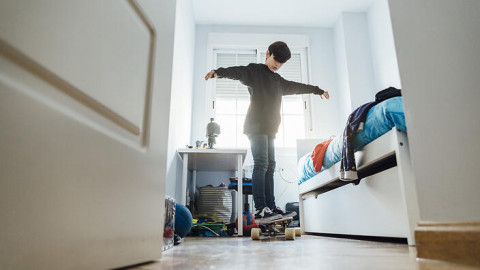
Elliot Mitchell
They didn’t hurt anyone, break anything or smoke.
Maybe it’s the venue. An empty school has an unsettling vibe, and we’re meeting on the first day of the holidays, with no kids around. A single shaft of sunlight pierces the room to sad effect. Or maybe it’s just that I’m tired. Because I am. Very tired.
But what’s got my chin quivering a little, my eyes alive to the threat of tears, are the faces that encircle me, each beaming kindness my way. Four faces. My child’s two home group teachers, their assistant and the school’s ‘Learning Enhancement Co-ordinator’. Four kindly faces and mine, which is wobbling. Together we form the child’s Student Support Group (SSG), something every child with ‘additional needs’ is meant to have in place.
Our child is autistic and the subject of regular meetings of this SSG. But this particular get-together thrums with the significance of their recent suspension from school - the second in six months. The school runs your standard three-strikes system. The way things are going, making it to the fifth grade is touch-and-go.
Our child is autistic and the subject of regular meetings of this SSG.
What did my child do, then? A student, barely 10, to be slapped down with a pair of snap exclusions from school?
They didn’t hurt anyone, break anything or smoke. The first time they were suspended, it was due to a lot of enraged and disturbingly proficient swearing at kids who had been winding them up (and winding them up can be a recess theme for some). The second - well, the school has been sort of vague about the circumstances, citing a range of burp/eyeroll-level classroom disruptions and the odd anger episode, seasoned with profanity. Sketchy specifics.
The classroom assistant, who has the kindliest face of all - let’s call her Mrs K - leans toward me.“The other day in class they were making those loud noises, so I told them to stop, and do you know? They didn’t realise they were doing it.”
It’s an independent school. We’re not that comfortable with private education but love has a way of bending principles, so here we are.
They were falling behind and into perpetual, confused disengagement at the local government school, with no Mrs K equivalent and no funding for a class aid.
Our child was falling behind and into perpetual, confused disengagement at the local government school, with no Mrs K equivalent and no funding for a class aid. I remember the principal there, a puppy-eyed man who’s easy to warm to, apologetically explaining to me that this was because our child’s literacy lag was too insignificant and - ironically - their behaviour nowhere near problematic enough for any aid application to get past the starting post.
One of their current teachers, also Junior School head (let’s call her Mrs P), speaks up now. “Well, lots of us have our things, don’t we? I know I’ve got mine. There are a couple of whistlers in the year-group, too.”
There is an elephant among us in this meeting-room. You can make out its shape if you squint through that shard of sunlight. The inclusivity elephant.
Though the school is independent and gets to draft its own guidelines around suspensions and removals (take note, parents of neurodivergent children with thoughts of going private), tightening or loosening here and there as conditions compel, it does need to meet the Disability Standards for Education, and everyone in this room knows it.
I clear my throat, partly to keep my chin under control and the tears from rising (like many men, I am an inept and messy weeper).
“With respect,” (a bit hostile, that, but it’s out before I know it) “While lots of children might have their ‘things’, it’s a little different for a child on the spectrum.”
The Learning Enhancement Co-ordinator now speaks up, hastily reassuring me that of course they understand the differences, that “reasonable adjustments are always made” - a bold nod to the inclusivity elephant, this - even as I notice that kindly light in Mrs P’s eyes bedimmed by a sudden frost.
“We have the other children to think about, too,” she points out, “And the impact on the school community.”
And all of a sudden, I’m not tired. Not at all. Chin no longer quivering, but set with the determination of a parent getting used to fighting their child’s corner.
For inclusivity to work, the kid needs to want to be included. So I’m tabling a motion to this SSG: that, besides our child’s impact on the school community, we pay attention to its impact on my child. And instead of focusing on their failures, how about some appreciation of their efforts? Celebrating the stuff they get right might show them they’ve been worthwhile, and ensure they keep doing them.
Celebrating the stuff they get right might show him they’ve been worthwhile, and ensure he keeps making them.
Because I see the strain on them of the day-to-day, how worn out he is with just getting what’s expected and what’s not, with keeping a lid on that sense that they're never fitting in. The goading asides. The sly button-pushing. The mysterious entanglement of social cues that every walk across the schoolyard inflicts. All the tiny triggers. My child tells me about them.
And about the teachers, outside the SSG’s kindly crew, who are impatient when they're muddled, who shout so that “my head gets fuzzy, and I don’t want to, but I swear”, teachers oblivious to tiny triggers and cumulative pressures, who just hear the bad word from the mouth of the bad kid, whose card is already marked.
The bad kid who is not bad, but beautiful, whose struggle I’ll speak up for, as long as I can find the voice and until theirs is heard.
*Real names have not been used.